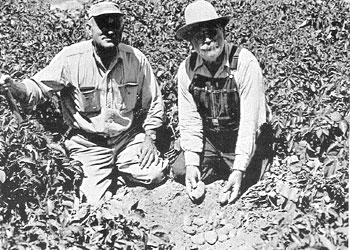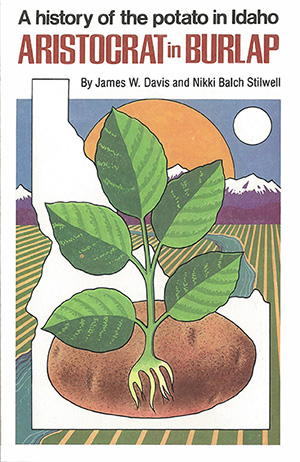JOE MARSHALL BECOMES LEGENDARY "IDAHO POTATO KING"
 Joe Marshall frequently dug in fields to check crop's progress.
Joe Marshall frequently dug in fields to check crop's progress.
Joe Marshall formed a strong identification with the Idaho® potato and with this came a desire to deliver it to the consumer in the very-best condition. For this reason, he handled the marketing of his own potatoes, doing the sorting and packing in the cellars on his farm. The potatoes were cleaned by brushing, since Marshall believed that washing was a bad practice and tended to deteriorate the quality of the potatoes before they could be delivered to the consumer. He also developed a consciousness of bruising and injury to the tubers very early in his experience. He always insisted that employees handle the potatoes carefully.
Joe Marshall left Idaho in 1919 to construct an irrigation project in Utah and returned in 1921. During these years, the Idaho potato industry had developed some serious problems. It was a common practice to save the small potatoes out of each year's crop for the next year's seed, and most of the growers were having disease and quality problems. Coupled with that, prices paid farmers for potatoes had reached a very-low point in 1921 and many of the farmers in the Twin Falls area were in serious financial trouble.
A great many of them had mortgaged their farms to banks in the area, and the bankers were extremely concerned about the economic condition of the farmers in general. After discussing the situation with several banking organizations, Joe Marshall accepted the responsibility for overseeing the operation of farms on which these banks had mortgages. The banks were eager to have the farmers prosper, pay back their loans, and save their farms. It was Joe Marshall's responsibility to see that the farms were properly operated and that the sincere, conscientious farmers were able to overcome their financial problems.
During this period of time, Joe Marshall not only operated his own farm, but many others as well. He bought a Model-T Ford and constructed a pickup type box on the back. Traveling constantly from morning to night, he went from one farm to another advising growers on irrigation practices, cultivation, harvesting procedures, storage, and all aspects of their farming operation. He urged most of the farmers to grow potatoes because the potential cash income from the crop offered a solution to the depressed economic conditions in Idaho farming in general.


 Joe Marshall frequently dug in fields to check crop's progress.
Joe Marshall frequently dug in fields to check crop's progress.